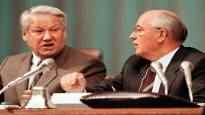The last leader of the Soviet Union, Mikhail Gorbachev, set in motion a change whose pace and outcome he no longer controlled, writes ‘s former Moscow correspondent Jyrki Saarikoski.
18:05•Updated 19:47
I watched from the window of ‘s Moscow office as the tanks rolled down the ring road of the city center. It was August 19 in 1991, and the coup attempt of the Soviet leader Mikhail Gorbachev to defeat had started.
In two or three days, we saw how the old communists’ and officers’ company collapsed into its own impossibility. The tankmen assigned to Moscow did not want a return to the old ways.
However, their hero was not Gorbachev, but the popular leader of Russia Boris Yeltsin.
The time of Gorbachev, who returned from Crimea, was over. Yeltsin publicly humiliated him in front of the cameras, and as Western countries celebrated Christmas, the former general secretary of the NKP and leader of the superpower abdicated. At the same time, the story of the NKP and the Soviet Union ended. This was largely due to Gorbachev – although not his goal.
The beginning had been promising. Gorbachev’s rise to the leadership of the Soviet Union in the mid-1980s marked a change in both generation and style.
In place of grim, end-of-life leaders, we saw a smiling Gorbachev, whose “perestroika” promised change, and “glasnost” freedom of speech. We also immediately saw an anti-drunkenness campaign, which replaced the serving of vodka with fresh juice – which annoyed Russians and amazed foreigners.
Despite the slogans, the change of the frozen kingdom did not start suddenly.
When I first replaced ‘s Moscow correspondents in the summer of 1985, the main news topic was the American accusation that the KGB used “spy dust” to spy on diplomats. The Cold War continued.
At the end of the decade, when I was once again a permanent correspondent, the atmosphere had already changed. Young people played guitar on the streets of Moscow.
Gorbachev had set in motion a change whose pace and outcome he no longer controlled. In the West he enjoyed the popularity of a rock star, what Raisa Gorbachevna participation in the visits only increased.
President of the United States Ronald Reagan The appeal presented in Berlin – “Mr. Gorbachev, tear down this wall” – encapsulated the West’s wish, which then also came true.
Still a brilliant Gorbachev was a leader who came to power through a one-party system, whose popularity was never tested in elections.
The Soviet Union was a natural thing for Gorbachev. So he was probably genuinely surprised by how completely the peoples of Eastern Europe and the countries attached to Moscow’s sphere of influence had had enough of the Soviet way of life.
In one conversation recorded on video, a confused Gorbachev tries to topple the Baltic independence speeches.
When those words turned into actions and Moscow’s security apparatus tried to suppress the protests with violence, the indecisive Gorbachev was caught between two camps. At one point he became the scapegoat for all problems in the eyes of the Russians.
Germany had been united, Eastern Europe had been liberated and the nations forcibly annexed to the Soviet Union had become independent – but everyday life in Russia was plagued by chaos and poverty.
In the eyes of the citizens, freedom of speech and democracy were poor compensation for the fact that the great power status was gone and life was uncertain. The verdict of the citizens made Mikhail Gorbachev in turn a man of the past – which paved the way for his successors, and set back the reforms that began fumbling.
